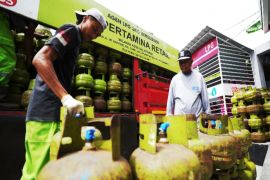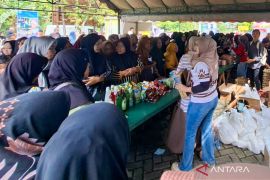Banjarbaru, S Kalimantan (ANTARA) - The scarcity and hiking prices of cooking oil in South Kalimantan is getting worse that people scream for difficulties to get these basic necessities.
"Even if available in stores, the cheapest is Rp40,000 for a 2-liter package. Some even sell Rp45,000 today," said Nabila, a resident of Landasan Ulin, Banjarbaru City, Sunday.
To obtain cooking oil according to the highest retail price (HET) as stipulated by Regulation of the Minister of Trade No. 6 of 2022 Rp14,000 per liter for premium packaging, residents can only expect from modern retail stores.
However, people can only buy to a maximum of one package for Rp28,000 per consumer. Whereas cooking oil in modern retail is often attacked by the public and sold out in a short time.
A trader in Banjarbaru admitted that he bought two liters of Filma cooking oil for Rp28,000 and then resold it for Rp40,000.
"I am also required to buy several other products if I want to get cooking oil by salesperson who usually offer goods such as instant noodles and soy sauce. So it's a kind of package," he said.
Economist from Lambung Mangkurat University (ULM) Hidayatullah Muttaqin SE, MSI, Pg.D said the government has made efforts to stabilize cooking oil prices through HET at Rp11,500 per liter of bulk cooking oil, Rp13,500 for simple packaging, Rp14,000 for premium packaging but had no avail yet.
"This is very concerning and heartbreaking. The largest producer of palm oil in the world, but the cooking oil is scarce and expensive," he said.
Related news: Banjarmasin deploys cooking oil supervisory team
Related news: S Kalimantan govt distributes cooking oil to small businesses
Related news: No cooking oil cartels detected so far: police
The average price of bulk cooking oil at the national level based on SP2KP data from the Ministry of Trade on March 11, 2022, is Rp16,037 for bulk cooking oil, simple packaging Rp16,401 and premium packaging Rp18,403.
This is higher than the price level at the end of February. Meanwhile, the retail price in the community is much higher than the national average price.
According to Muttaqin, for retail traders who have purchased cooking oil at a price above HET, there is no subsidy or compensation to lower the price.
On the other hand, retail traders are also facing a shortage of cooking oil supplies from agents and distributors. As a result, there a shortage of cooking oil at the retail level is inevitable.
Muttaqin said the scarcity was triggered by two problems. First is the act of hoarding so that the distribution of cooking oil to the community is disrupted.
Meanwhile, the fasting month of Ramadan is approaching, which is usually followed by higher consumption of cooking oil than usual times.
"It needs foresight and firmness of the government and the police in supervising the distribution chain of cooking oil in every region from producers, distributors, agents to traditional markets, modern markets, and grocery stalls," said the economist who graduated from the University of Birmingham, England.
Second, the government's policy regarding domestic market obligations towards CPO producers is not running effectively.










